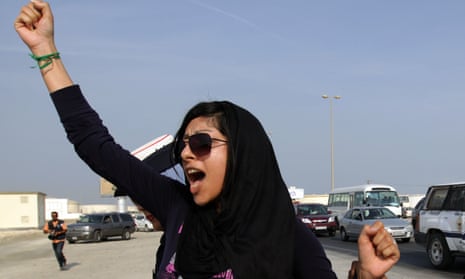Bahraini authorities have released the opposition activist Zainab al-Khawaja, who had been imprisoned with her toddler son since March, on “humanitarian” grounds, a public prosecution official has said.
Khawaja, who also holds Danish nationality, had been convicted of insulting King Hamad by ripping up a picture of him, and had chosen to keep her 17-month-old son with her in jail.
Judicial authorities ordered the suspension of the sentence for Khawaja and another defendant identified as Irena Bogotova who had been jailed with her four-year-old son, Abdulrahman al-Sayed said in a statement.
They were released “considering their humanitarian situation and in the interests of their children,” he said. Bogotova is reportedly Russian, but no details have been given about her case.
Khawaja, a Shia Muslim, is the daughter of prominent rights activist Abdulhadi al-Khawaja, who is serving a life sentence for plotting to overthrow the Sunni regime.
The Gulf Centre for Human Rights (GCHR) said Khawaja was jailed for three years and one month on charges including tearing up the monarch’s picture and insulting a police officer.
Her sister Maryam, co-director of the GCHR, confirmed on Twitter that Khawaja “is officially out and on her way home to her (other) children”.
The foreign ministry said earlier in May that Khawaja would be freed with another foreigner for humanitarian reasons, adding that their release was the result of a follow-up into the situation of inmates with foreign citizenship held in criminal cases.
The foreign minister, Sheikh Khalid bin Ahmed al-Khalifa, said during a press briefing with the visiting US secretary of state, John Kerry, in April that Khawaja would go home.
Brian Dooley of Washington-based Human Rights First said in a statement that “while it is better that” Khawaja and her son “are out of rather than in prison, this is no major breakthrough for human rights, (and) no indicator of fundamental reform”.
“If the Bahraini government is interested in serious reform it will immediately organise a mass release of political prisoners,” he said.
Tiny but strategic Bahrain, home base of the US navy’s Fifth Fleet, remains deeply divided after authorities crushed a month-long, Shia-led uprising that called for reforms in March 2011. Dozens of activists are serving lengthy jail terms, including Sheikh Ali Salman – the leader of Bahrain’s main opposition bloc al-Wefaq.
An appeals court on Monday increased his jail term on charges of inciting violence to nine years from the original four, a judicial official said.

Comments (…)
Sign in or create your Guardian account to join the discussion